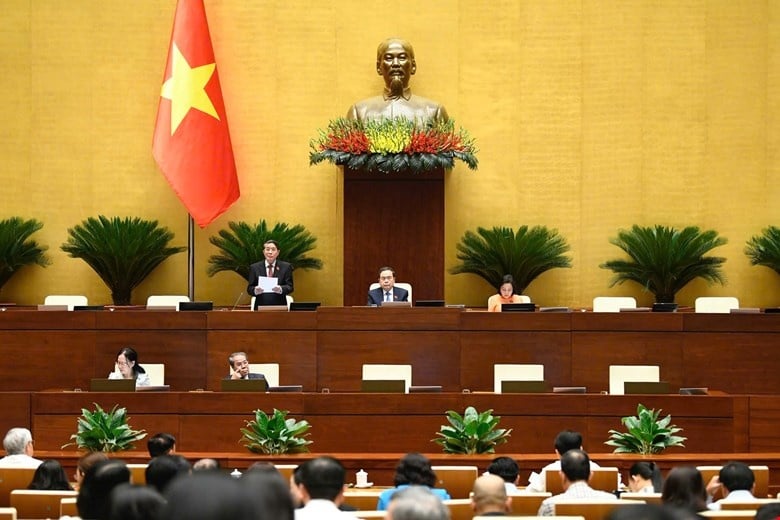 |
| Vice Chairman of the National Assembly Nguyen Duc Hai chaired the meeting. |
Ensuring comprehensiveness and consistency in tax policy
The draft Law amending and supplementing a number of articles of the Law on Corporate Income Tax was developed to institutionalize the Party's policies, especially Resolution 57-NQ/TW on the development of science, technology, innovation and Resolution 68-NQ/TW on the development of the private economy . Presenting the report on explanation, acceptance and revision, member of the National Assembly Standing Committee Phan Van Mai said that the draft law has been completed based on the opinions of National Assembly deputies, National Assembly delegations, the Government and specialized conferences, ensuring feasibility and consistency with the legal system.
Regarding the provisions on taxable income, Mr. Phan Van Mai emphasized that the draft law retains the provisions on “other income” in addition to the specifically listed income, in order to ensure comprehensiveness and establish a legal basis for tax collection on all income from production and business activities of enterprises. This provision is especially necessary to cover newly arising incomes that have not been regulated because they have not appeared in practice at the present time. This provision is inherited from the current law, does not cause difficulties in implementation, so it is proposed that the National Assembly keep it as drafted.
To ensure the consistency and synchronization of the legal system, the draft law adds a provision that if other laws have provisions on corporate income tax incentives different from this Law, this Law shall apply. Mr. Phan Van Mai said that this provision aims to focus tax incentive policies in tax legal documents, ending the integration of tax incentives in specialized laws, ensuring comprehensiveness, consistency and ease of implementation. The National Assembly Standing Committee has directed the review of tax incentives in newly passed specialized laws at the 8th Session, the 9th Extraordinary Session, draft laws at the 9th Session, as well as the Capital Law and resolutions on specific mechanisms and policies, to appropriately incorporate them into the draft law. Accordingly, the draft has been revised to supplement tax incentives from specialized laws, while ensuring that incentives are focused, not spread out, with the highest incentives reserved for science and technology, new technology, high technology and strategic investment projects.
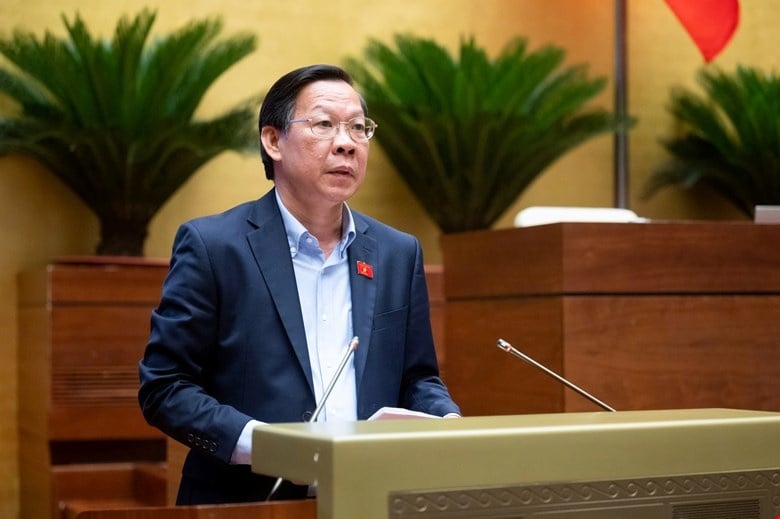 |
| Chairman of the Economic and Financial Committee Phan Van Mai reports to the National Assembly |
Promoting science, technology and private economy
One of the highlights of the draft law is the tax incentives to encourage the development of science, technology and innovation, clearly demonstrating the spirit of Resolution 57-NQ/TW. Mr. Phan Van Mai said that the draft has added a provision allowing businesses that donate funding to deduct funding for technology development, innovation and digital transformation from expenses when calculating corporate income tax, and businesses that receive funding are exempt from tax on this income, regardless of whether the funding comes from an independent business or an affiliated business. However, he noted that some opinions are concerned about the risk of taking advantage of the policy to transfer prices, transfer profits or evade taxes, because spending on technology development is often large, wide-ranging and lacks specific regulations on market pricing. He proposed that the National Assembly consider adding tax exemption regulations for all funding as proposed by the Government, and at the same time request the Government to issue full regulations to combat transfer pricing, monitor and evaluate the impact of the policy, and report to the National Assembly for timely adjustment if necessary.
The draft also adds a provision allowing enterprises to deduct additional expenses, higher than the actual expenditure, for research and development activities when determining taxable income. This content is revised to assign the Government to specify in detail the additional expenditure level, conditions and scope of application, creating a flexible legal basis suitable for practice. The draft has added funding and expenses for scientific research, technology development, innovation and digital transformation in enterprises to the list of deductible expenses when calculating corporate income tax, meeting the requirements of promoting science and technology.
Regarding support for small and medium-sized enterprises, the draft proposes preferential tax rates of 15% and 17% based on revenue criteria, instead of the complicated criteria of the Law on Support for Small and Medium-sized Enterprises, to ensure simplicity, convenience and consistency with tax administration. He explained that small and medium-sized enterprises account for nearly 94% of all enterprises, so using revenue criteria helps avoid spreading incentives, while these enterprises still enjoy higher incentives if they meet the conditions on locations or investment incentive sectors.
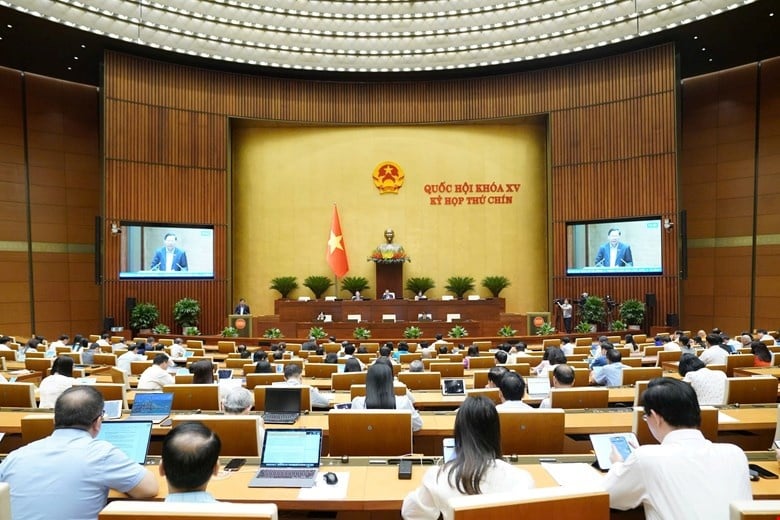 |
| Panorama of the parliament |
Increase flexibility and transparency in tax administration
The draft law focuses on resolving practical problems through adjusting deductible expenses when calculating corporate income tax. Mr. Phan Van Mai said that the draft has been revised to stipulate a separate item for expenses not related to production and business activities but included in deductible expenses, to ensure specificity, clarity and avoid confusion. Some specific expenses that have arisen in practice have also been added to the list of deductible expenses, helping to remove difficulties for businesses and localities.
Regarding the offsetting of profits and losses between real estate business activities, investment project transfers and other business activities, the draft has amended current regulations to allow offsetting, creating favorable conditions and ensuring fairness for multi-sector real estate businesses, contributing to achieving the economic growth target of 8%. However, he noted that some opinions are concerned about the risk of taking advantage of the policy to reduce tax obligations through intentional loss accounting. He suggested that the National Assembly agree with the Government's proposal, but requested the Government to organize implementation to avoid abuse, and continue to assess the actual impact to eliminate risks.
Regarding tax incentives for specific sectors, the draft has been revised to apply a uniform preferential tax rate of 10% to all types of newspapers, similar to print newspapers, to support the press industry in the face of the challenge of competition with digital platforms. Regulations on tax incentives for the production of products and provision of digital technology services have been adjusted to be consistent with the draft Law on Digital Technology Industry, appropriately supplemented in Clause 2, Article 12. Regarding expanded investment incentives, he proposed to maintain the current regulations to encourage businesses to expand production and business, with preferential tax exemptions and reductions for additional income from expanded investment projects, but not apply tax rate incentives to avoid different interpretations.
Regarding the time for disbursing capital for projects enjoying special investment incentives, Mr. Phan Van Mai said that the draft has been revised to assign the Government to specify specific regulations to meet the country's new development requirements. The National Assembly Standing Committee is directing the review and update of the contents of Resolution 68-NQ/TW, such as tax incentives for small businesses, startups and venture capital funds, to complete the draft law.
Source: https://thoibaonganhang.vn/tao-dong-luc-manh-me-cho-doanh-nghiep-huong-den-muc-tieu-tang-truong-kinh-te-8-164036.html


![[Photo] Prime Minister Pham Minh Chinh chairs meeting on science and technology development](https://vphoto.vietnam.vn/thumb/1200x675/vietnam/resource/IMAGE/2025/5/17/ae80dd74c384439789b12013c738a045)
![[Photo] More than 17,000 candidates participate in the 2025 SPT Competency Assessment Test of Hanoi National University of Education](https://vphoto.vietnam.vn/thumb/1200x675/vietnam/resource/IMAGE/2025/5/17/e538d9a1636c407cbb211b314e6303fd)



![[Photo] Readers line up to visit the photo exhibition and receive a special publication commemorating the 135th birthday of President Ho Chi Minh at Nhan Dan Newspaper](https://vphoto.vietnam.vn/thumb/1200x675/vietnam/resource/IMAGE/2025/5/17/85b3197fc6bd43e6a9ee4db15101005b)






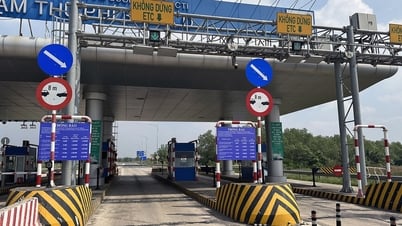







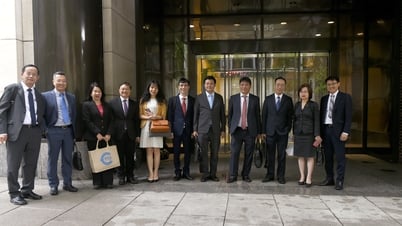

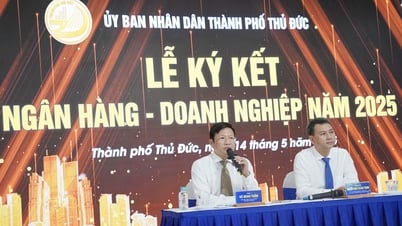

![[Photo] Nearly 3,000 students moved by stories about soldiers](https://vphoto.vietnam.vn/thumb/1200x675/vietnam/resource/IMAGE/2025/5/17/21da57c8241e42438b423eaa37215e0e)
























































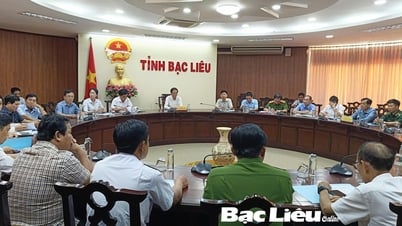


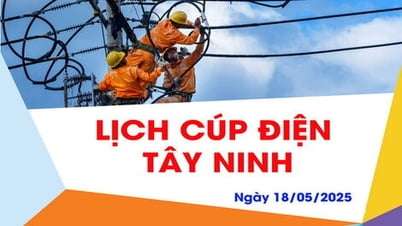














Comment (0)